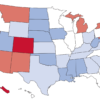University of Liverpool researchers have conducted the first comprehensive analysis of the substantial health gain that can be realized when switching African homes from polluting fuels to clean fuels such as bottled gas (Liquefied Petroleum Gas, LPG). Evidence from this global evidence synthesis has crucial energy and health policy implications for the region.
In sub-Saharan Africa, more than 80% of the population rely on solid fuels (firewood, charcoal) and kerosene for cooking, heating and lighting in their homes. However, pollution from burning these fuels is responsible for more than 680,000 premature deaths each year in the region.
The paper demonstrates a significantly lower risk of a range of health conditions when switching from polluting solid fuels and kerosene to use of clean gas for cooking or heating. Published in The Lancet Respiratory Medicine, the paper was led by Dr. Elisa Puzzolo, senior research fellow, and Professor Dan Pope, Professor of Global Public Health at the University of Liverpool and Directors of the NIHR Global Health Research Unit on CLEAN-Air(Africa).
This paper presents the latest piece of research completed by the NIHR Global Health Research Unit on CLEAN-Air(Africa) to address the major global health challenge from household air pollution. CLEAN-Air(Africa) is a partnership of public health experts from academic, research, and clinical institutions from the U.K., Cameroon, Kenya, Tanzania, Rwanda, and Uganda. Working with governments from each country, the collaboration provides evidence to help inform policies to scale clean cooking for households and schools.
This is the first systematic review with meta-analyses that has comprehensively assessed all health effects from use of gaseous fuels (natural gas, LPG and biogas), compared to both polluting fuels and electricity, for household cooking and heating on a global scale. Previous systematic reviews have been limited due to a paucity of evidence, reliance on historical data and/or a focus on single health outcomes or specific energy uses.
Although the review identifies a small increase in risk from use of gaseous fuels compared to electricity for childhood asthma, pneumonia and chronic obstructive respiratory disease, the substantial health gain from switching from polluting solid fuels and kerosene to LPG is critical.
As noted by the International Energy Agency in a recent report, LPG is the most realistic option for rapid scale to clean cooking for much of sub-Saharan Africa and is critical for clean energy policy in the region with only six years to the Sustainable Development Goal 7 (universal energy access) target.
Dr. Elisa Puzzolo said, “Exposure to household air pollution from polluting domestic fuel represents a substantial global public health burden. Switching from polluting to gaseous household fuels will likely lower the health risks and associated morbidity and mortality. By summarizing both potential positive and negative health impacts from household use of gaseous/ alcohol fuels, this paper provides important contemporary evidence to inform national clean energy policies.
“Unfortunately, Western concerns over promotion of fossil fuels such as LPG are inhibiting investment in scale of clean cooking in the Global South. Together with the Stockholm Environmental Institute and international leads in climate impact modeling, CLEAN-Air(Africa) has also published seminal research demonstrating that the substantial health gain from global scale of LPG for clean cooking does not impact climate.
“In addition, prospects for production of fully renewable BioLPG from municipal solid waste in African cities are becoming a reality.”
More information:
Elisa Puzzolo et al, Estimated health effects from domestic use of gaseous fuels for cooking and heating in high-income, middle-income, and low-income countries: a systematic review and meta-analyses, The Lancet Respiratory Medicine (2024). DOI: 10.1016/S2213-2600(23)00427-7
Provided by
University of Liverpool
Citation:
New health evidence advocates for clean fuels in African homes and schools (2024, February 2)



